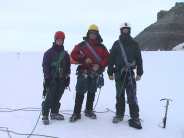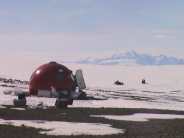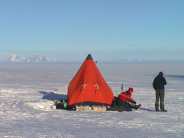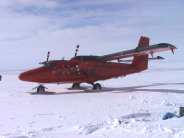Hi,
It�s been a while since I�ve written but the summer has just been
non-stop. There�s only five months to complete all the work before the sun
starts to disappear and the winter begins. Not that we�ve been blessed
with good weather this year, calm days and clear skies have been few and
far between. On the good side though the skiing is excellent and the slope
opposite the base is in great condition.
Ready For Work
 I have just
come back from my summer field trip on Alexander Island. These camping
trips take a huge amount of planning and preparation, as we have to be
prepared for every eventuality including the risk that you may be stranded
for weeks or months with no support. The planes were filled with tents,
skidoos, food, medical supplies, rescue equipment, science gear and a few
luxury items. Finally it was time to put on our deep field clothing, get
in the plane and relax after several weeks of frantic preparations. Two
hours later we landed on Utopia glacier, unloaded the plane, set up the
tents, checked the radios and then the plane left. Three women with one
tent standing on a glacier, 300 miles from Rothera, and 35 miles from the
our nearest neighbours, Ian and Will at Fossil Bluff fuel depot.
I have just
come back from my summer field trip on Alexander Island. These camping
trips take a huge amount of planning and preparation, as we have to be
prepared for every eventuality including the risk that you may be stranded
for weeks or months with no support. The planes were filled with tents,
skidoos, food, medical supplies, rescue equipment, science gear and a few
luxury items. Finally it was time to put on our deep field clothing, get
in the plane and relax after several weeks of frantic preparations. Two
hours later we landed on Utopia glacier, unloaded the plane, set up the
tents, checked the radios and then the plane left. Three women with one
tent standing on a glacier, 300 miles from Rothera, and 35 miles from the
our nearest neighbours, Ian and Will at Fossil Bluff fuel depot.
Apple Hut
 The peace didn�t
last for long when the next flight arrived bringing more equipment, food
and supplies. After two days and four flights we had seven people, four
tents, two skidoos and large stack of supplies all safely delivered and it
was time to start the science. My main job was to extract last years data
from our automatic weather station and carry out some routine maintenance.
The field hut, known as an apple hut (see picture), sits at the bottom of
some beautiful sandstone cliffs and in front of giant ridges of ice. These
pressure ridges are formed when the ice shelf moves across George VI sound
and pushes up against Alexander Island. During the summer small ponds form
at the foot of the cliffs and it is here that life thrives. Active sites
like these allow us to study the effects of extreme environmental
conditions on biological life. What a surprise it is to find orange
lichens and green algae and in such a barren area that is covered in snow
for most of the year.
The peace didn�t
last for long when the next flight arrived bringing more equipment, food
and supplies. After two days and four flights we had seven people, four
tents, two skidoos and large stack of supplies all safely delivered and it
was time to start the science. My main job was to extract last years data
from our automatic weather station and carry out some routine maintenance.
The field hut, known as an apple hut (see picture), sits at the bottom of
some beautiful sandstone cliffs and in front of giant ridges of ice. These
pressure ridges are formed when the ice shelf moves across George VI sound
and pushes up against Alexander Island. During the summer small ponds form
at the foot of the cliffs and it is here that life thrives. Active sites
like these allow us to study the effects of extreme environmental
conditions on biological life. What a surprise it is to find orange
lichens and green algae and in such a barren area that is covered in snow
for most of the year.
Camp A
 Life
in the field is very simple and I just loved having nothing more to worry
about than whether I was going to ski to the hut that day or take the
skidoo, what science to do next and what to have for dinner. We had daily
radio contact with Rothera and several conversations with other field
groups to catch up on some news and gossip. Meals were basic because there
are only so many things you can do with dehydrated beef. Luckily
Marie-Francois my French tent-mate had brought some little luxuries
including some very stinky cheese, smoked sausage, and a small bottle of
port.
Life
in the field is very simple and I just loved having nothing more to worry
about than whether I was going to ski to the hut that day or take the
skidoo, what science to do next and what to have for dinner. We had daily
radio contact with Rothera and several conversations with other field
groups to catch up on some news and gossip. Meals were basic because there
are only so many things you can do with dehydrated beef. Luckily
Marie-Francois my French tent-mate had brought some little luxuries
including some very stinky cheese, smoked sausage, and a small bottle of
port.
Mairi's Bus
 One of the
highlights of the trip was receiving an airdrop of post and fresh bread.
The Twin Otter flew low over the camp and someone pushed the bag out of
the back door. The next day the weather turned bad and we were stuck in
the tents all day. Luckily I had received four John O�Groat Journals in
the airdrop so everyone had something to read. Lie-up in the old days
meant a day of reading or cards until the weather was good enough to go
out again. Nowadays we have laptops and generators to power them and we
were able to watch a DVD. Dave�s choice was dreadful and the orange
colouring of the tent blanched the screen but we persevered just for the
novelty of it.
One of the
highlights of the trip was receiving an airdrop of post and fresh bread.
The Twin Otter flew low over the camp and someone pushed the bag out of
the back door. The next day the weather turned bad and we were stuck in
the tents all day. Luckily I had received four John O�Groat Journals in
the airdrop so everyone had something to read. Lie-up in the old days
meant a day of reading or cards until the weather was good enough to go
out again. Nowadays we have laptops and generators to power them and we
were able to watch a DVD. Dave�s choice was dreadful and the orange
colouring of the tent blanched the screen but we persevered just for the
novelty of it.
I�m back at Rothera now and I am enjoying the luxury of a shower,
normal toilet facilities and fresh food. I�ll write soon with more of my
summer exploits.
Mairi












